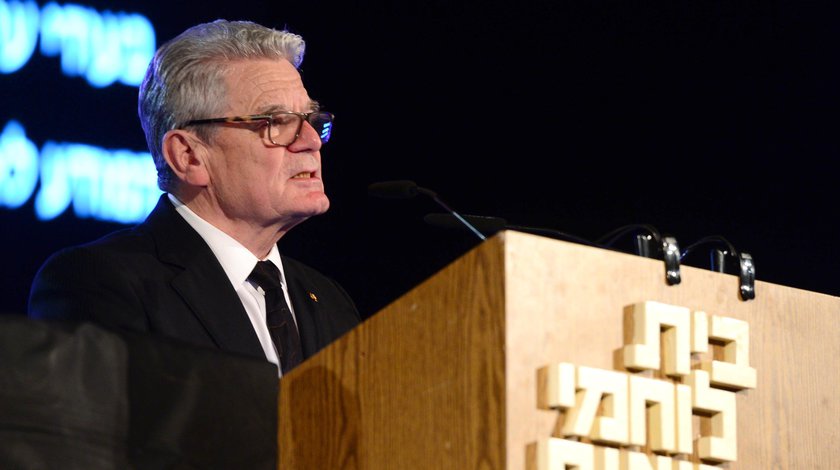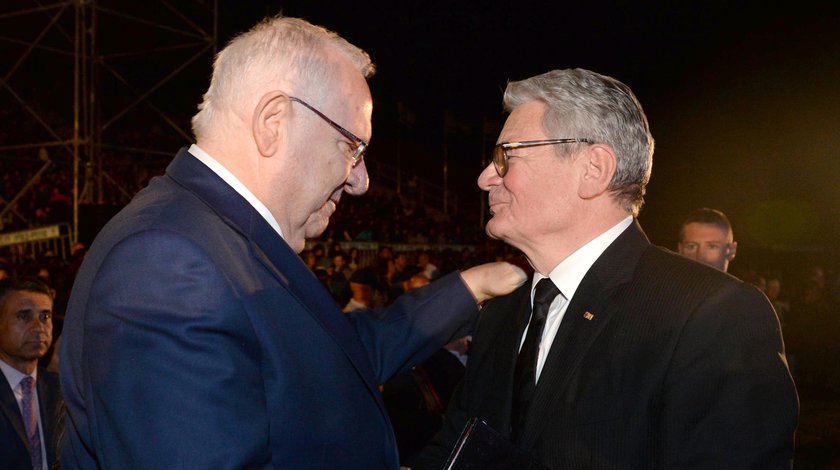
©Office of the President - Israel
Rede im Ghetto Fighters’ Museum
Teilnahme am Yom HaShoah in Israel
24. April 2017, Lohamei Haghetaot, Israel
Auf Einladung des Präsidenten des Staates Israel, Reuven Rivlin, ist Bundespräsident a.D. Joachim Gauck anlässlich des Holocaust-Gedenktages, Yom HaShoah, nach Israel gereist. Präsident Rivlin empfing ihn zu einem Gespräch in seiner Jerusalemer Residenz. Anschließend reisten Sie gemeinsam zum Museum Ghetto Fighters House in Lohamei Haghetaot.
Nach einem Rundgang durch das Museum Ghetto Fighters House gemeinsam mit dem Staatspräsidenten, hat Joachim Gauck im Amphitheater des Ghetto Fighter House eine Ansprache vor zahlreichen Gästen, unter ihnen Überlebende der Shoah, gehalten.

©Office of the President - Israel
Austausch mit dem israelischen Staatspräsidenten Reuven Rivlin anlässlich des Holocaust-Gedenktages, Yom HaShoah
Ansprache von Bundespräsident a.D. Joachim Gauck
Before you stands a man, a German man, who has been moved by what he has seen today. My eyes are drawn in particular to the men and women who survived the Holocaust and are here with us today. And I am moved by the generosity of heart with which you have received me.
Today, on Holocaust Remembrance Day, I pay my respects to those who were once ostracised, humiliated, persecuted and murdered by another Germany, because they were Jews. I will never think of those inhuman actions with anything but a pronounced sense of horror and profound sadness. That is what I feel here, as well, at the Ghetto Fighters’ House Museum. I am deeply moved and filled with gratitude to be here with you on Yom HaShoah.
As President, I made a point of returning to the scenes of these horrific events and mass murders perpetrated by Germans. I visited the Jewish community in Ioannina in Greece. I stood in the woods of Babyn Yar. I stood at the gates and on the train tracks of Auschwitz. I met with survivors and listened to them and cried with them. I will never forget their stories. But above all, I will never forget their willingness to reach out in friendship to the Germans of today. Passing all of these experiences on to young Germans was one of my objectives during my Presidency, and it has remained one of my objectives even now, as I stand before you as a citizen aware of his responsibility to his country.
President Rivlin and I were born just a few months apart – in Jerusalem in 1939 and on the German Baltic coast in 1940. When Reuven was a young man, he saw the fledgling Israeli state grow and take root as the home of the Jewish people, a place of refuge for so many victims of persecution. He was surrounded by people who had been robbed of their friends and family, of their worldly goods and their homeland by Hitler’s Germany. Like millions of Israeli passports, his bore the words, “Valid to any country except Germany”. I know and understand why many Israelis regarded their country’s initial diplomatic overtures to the young Federal Republic of Germany with immense scepticism. I think it’s fair to say that the young Reuven Rivlin was one of those people.
Today, Reuven Rivlin and I are older. We have had the privilege of seeing the improbable come to pass. Today, Israelis and Germans recall the past together, and commemorate the victims of National Socialism together. History no longer divides our peoples. It forms a bond that joins us.
The fact that we have succeeded in growing so close – in cultural, political, and above all in human terms, is in part due to the fact that when I was young, I and millions of other Germans began to read about and realise what Germans before us had done. There was a time when I was ashamed to be German. I was unable to like my country. I hated it even. My generation viewed our parents with disgust. They disclaimed all culpability, they allegedly knew nothing. The majority of them still maintained this silence in the 1950s and ’60s and refused to accept responsibility for what had happened. But this attitude has changed during the last fifty years. The German have learned to accept the historical facts, the guilt and the responsibility. It was a painful process - but it has created a new Germany: honest and trustworthy. I am sure, Reuven, that we are both filled with joy to see that our people are so close today, not just in diplomatic statements, but also in real everyday life. And as a German who was born in 1940, I want to repeat that I am also filled with gratitude so great that I have no words to express it.
I may have been the last German President to have been born during the war and during the Shoah. For me, personally, that is a significant fact. But for the German people’s historical awareness and sense of responsibility, year of birth is irrelevant. I have said it many times before. Even future generations of Germans will not have an identity unblemished by Auschwitz. The special and lasting connection between our peoples and Germany’s particular solidarity with the democratic State of Israel will remain part of their identity. Mr President, honoured friends, I will always remember that you invited me to join you in this act of shared commemoration and that you listened to me, on this day and in this place. Thank you.